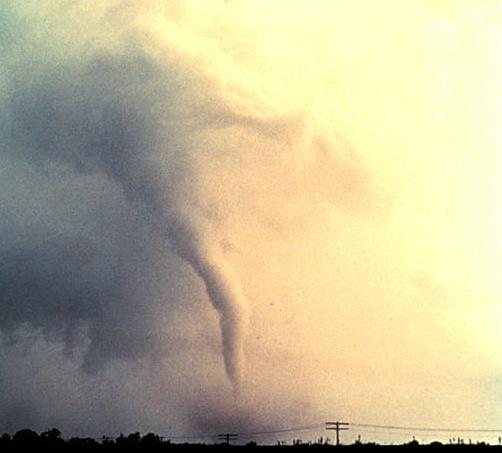BROOKE GLADSTONE: This is On the Media. I’m Brooke Gladstone. As I mentioned, the Oklahoma tornado did put a stop to the scandal blitz, but only briefly. Blogger Andrew Tyndall of the Tyndall Report, found that the tornado filled 91 percent of the three network evening news holes on Monday and all of them on Tuesday. But by Wednesday, tornado coverage dropped to just a third and scandal crept back in.
We've brought back Brendan Nyhan, our scandal coverage scholar, to explain why. He says the problem is that tornadoes comes suddenly, wreak destruction locally and then pass quickly, while hurricanes, say in the Atlantic Basin, allow for a predictably exciting narrative. You know, it – the gathering storm, the warnings and preparations, the widespread damage and, in the aftermath, the congratulations, or blame. No tornado, he says, could have torn up a media landscape that at this moment is so fertile for scandal.
PROF. BRENDAN NYHAN: The conditions are right for scandal right now. We know that second-term presidents are more vulnerable to scandal. Obama had very few scandals in his first term, so there is a – there’s a bit of a pent-up demand –
[BROOKE LAUGHS]
- for scandal on the part of both the media and the opposition. And two factors that I’ve identified in my research are present. The opposition party base does not like Obama at all, and we know that the legislators in Congress are going to be responsive to that in pursuing scandal allegations. And there are very few competing news stories. So these - these scandals got off the ground before the tornado because Obama's legislative agenda is stalled, and there aren’t very many interesting political stories going on right now. So scandal filled that news vacuum. The convergence of those three stories was especially powerful in, in jumpstarting the, the scandal conversation.
BROOKE GLADSTONE: Right, and the media seemed to enjoy combining the three scandals into a great big one, crafting, as you recently wrote in the Columbia Journalism Review, an “Obama narrative.” You mentioned hurricane narratives - we love narratives. What's the Obama narrative?
PROF. BRENDAN NYHAN: Well, what's funny is that the media can’t even agree on what the narrative is.
BROOKE GLADSTONE: [LAUGHS] That's a good sign!
PROF. BRENDAN NYHAN: [LAUGHS] The media and, and the Republicans, who are pushing scandal, have been trying out different stories. On the one hand, people have argued that these reflect Obama's overweening influence and politicization of government and, on the other hand, his incompetence and lack of management skills. In either case, people are struggling to fit these into one template. And I think it's quite an awkward fit.
The AP records dispute is more of a policy dispute than anything else. The IRS allegations have not been closely linked to Obama, although the – you know, the questions continue about who knew what, when. And then, finally, the Benghazi case – it’s not clear how much misconduct was involved. Bureaucracies edit talking points all the time.
BROOKE GLADSTONE: Right. What about the outrage that seems to be evinced over things that are - either nonexistent or, frankly, laughable, asking Marines to hold an umbrella over himself and the Turkish Prime Minister, so they didn't get drenched?
PROF. BRENDAN NYHAN: When a feeding frenzy takes place and scandal is on everyone's mind, seemingly innocuous events and gestures can become swept up. What was amazing was the Washington Post wrote [LAUGHS] a whole story about the umbrella controversy, and it was a story because Obama was being criticized for it. That made it news. And the news agenda is set, in part, by what prominent oppositional elites are saying. And the Republicans were able to drive even the umbrella controversy into the headlines.
A great example of this is when George H. W. Bush went to a supermarket and was portrayed as being out of touch because he reportedly didn't know how a supermarket checkout scanner worked. In fact, it was some sort of special scanner that was a new technology of some kind. But as it moved through the echo chamber, it was turned into a, a tidbit revealing the supposedly out-of-touch nature of Bush who was seen as a patrician.
BROOKE GLADSTONE: And it’s always the signs of elitism that gets picked up in these little ways.
PROF. BRENDAN NYHAN: We’re very sensitive to political leaders losing touch with the people they’re supposed to, to represent. And one of the narratives that can be powerful during a scandal is an out-of-touch President, embattled alone in the White House, haughty, resentful. You know, the media loves to write that story, and it becomes a way to keep the narrative moving during a second term, when typically there isn't that much going on on Capitol Hill.
BROOKE GLADSTONE: In my lifetime, I can remember that narrative for everybody, except maybe Ronald Reagan who wasn't depicted as haughty, just confused.
PROF. BRENDAN NYHAN: Reagan had his own special second term narrative, but it is a – it is a recurring theme, and we should expect to see the media reenacting those second term narratives over the next three years.
BROOKE GLADSTONE: Brendan, thank you very much.
PROF. BRENDAN NYHAN: Thanks again for having me.
BROOKE GLADSTONE: Political scientist Brendan Nyhan is an assistant professor in the Department of Government at Dartmouth College.
[MUSIC/MUSIC UP & UNDER]


